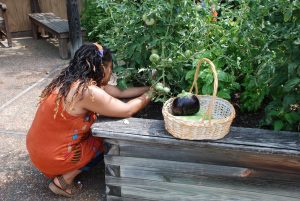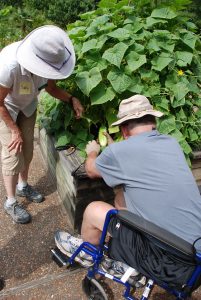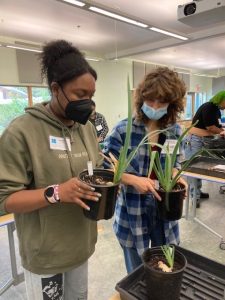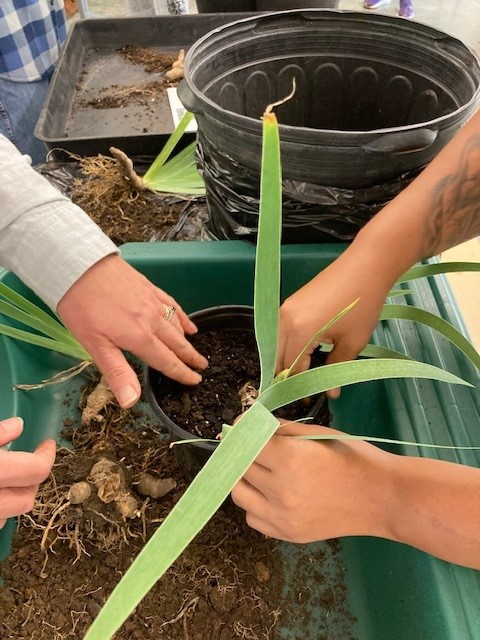By Emilee Weaver, Therapeutic Horticulture Program Manager
Therapeutic horticulture (TH) is a treatment intervention that uses plants and nature-based activities to work towards a participant’s personal health and wellness goals. Many of us have personal knowledge of the positive effects that gardening and spending time in nature can have on our minds and bodies, but research shows that professionally-facilitated interactions with nature increase and speed the positive psychological, physical, cognitive, social, vocational, and spiritual benefits of its participants. Spending an hour with a trained physical therapist is far more likely to meet the targeted treatment needs of a patient than passively walking in your neighborhood for an hour. The difference lies in passive versus active, targeted engagement. Just like other allied health fields, therapeutic horticulture practitioners receive specialized training to ensure they provide safe, effective, ethical treatment.
The North Carolina Botanical Garden has one of the oldest therapeutic horticulture programs in the U.S. For 45 years, NCBG has provided community-based direct TH services for diverse populations in the Chapel Hill area and offered educational training for experienced and emerging TH practitioners. Through the course of the program, we’ve touched the lives of individuals and groups who experience mental health concerns, traumatic brain injuries, those with disordered eating and substance use, caregivers, elders who experience memory loss and/or physical concerns, exceptional children, and many more who found healing, empowerment, and solace in expanding their relationship with the natural world. As we served the community and witnessed the astounding growth of our participants, we came to understand that providing true leadership in the field of TH meant that we not only need to provide direct service for those in need; we need to create an inclusive learning environment that equips the next generation of TH practitioners with the access to training, skills, and confidence to meet the ever-evolving needs of our community.
 In 2019, NCBG launched their first comprehensive therapeutic horticulture training opportunity by creating a year-long therapeutic horticulture certificate program. The program was designed to cross-train allied health and horticulture professionals with TH direct service skills. The certificate program was so well received, NCBG partnered with the NC State University Extension Gardener Program to transform the certificate content into a 100% Online Certificate in Therapeutic Horticulture. What was a small, nuclear TH community in North Carolina became a nationwide, worldwide community that could be accessed online in any time zone. Little did we know, the world was just as hungry for TH training as North Carolinians were.
In 2019, NCBG launched their first comprehensive therapeutic horticulture training opportunity by creating a year-long therapeutic horticulture certificate program. The program was designed to cross-train allied health and horticulture professionals with TH direct service skills. The certificate program was so well received, NCBG partnered with the NC State University Extension Gardener Program to transform the certificate content into a 100% Online Certificate in Therapeutic Horticulture. What was a small, nuclear TH community in North Carolina became a nationwide, worldwide community that could be accessed online in any time zone. Little did we know, the world was just as hungry for TH training as North Carolinians were.
Within two years, NCBG/NCSU’s Online Certificate in TH program has served 400 students from 29 different states and 11 countries. To earn a Certificate of Mastery, students must complete four, six-week long online courses over the course of one to two years. The program prepares students with background knowledge of TH and nature-based, research-proven interventions, equips them with participant and site assessment skills, activity and direct service skills, program development and management skills, funding and budget skills, and most importantly the confidence to facilitate a TH program in clinical and community-based sites. Knowing that many people prefer hands-on learning opportunities, NCBG transformed the 100% in person certificate program from 2019 into a Hybrid program that offers course content developed for the online program, as well as hands-on, in-person workshops at NCBG every second Saturday for nine months. The affordable and accessible online and hybrid models remove barriers for those who have work, family, or life circumstances that have prevented them pursuing a specialization or independent career in therapeutic horticulture.
 A lot of people ask me why I became a therapeutic horticulture practitioner. The answer is simple. I am compelled to find likeminded people who believe in the healing power of the natural world so that I can mobilize them to use their existing skills, education, life experience, and heart to reach humans who desire a deeper connection with their mental, physical, and spiritual health. A nun once said to me, “my role is not to judge, but to accompany.” Her words stopped me in my tracks. The sentiment felt so familiar, like something that I had always known in my spirit, and then it came to me. The moments in my life when I felt the most seen, heard, and understood were the times I spent immersed in nature. Perhaps it was my upbringing in the dense, sun-caught green forests of New Hampshire, the woodstove warmed log cabin, or the squirrel-like curiosity that kept me wrapped around 200-year-old maple limbs whenever humanly possible. I inherently understood and trusted the spirit of trees and learned what it felt like to be loved and accompanied unconditionally. When I heard the nun’s words, the internal ‘knowing’ of nature’s accompaniment bloomed in front of me and has shaped, motivated, and guided my career.
A lot of people ask me why I became a therapeutic horticulture practitioner. The answer is simple. I am compelled to find likeminded people who believe in the healing power of the natural world so that I can mobilize them to use their existing skills, education, life experience, and heart to reach humans who desire a deeper connection with their mental, physical, and spiritual health. A nun once said to me, “my role is not to judge, but to accompany.” Her words stopped me in my tracks. The sentiment felt so familiar, like something that I had always known in my spirit, and then it came to me. The moments in my life when I felt the most seen, heard, and understood were the times I spent immersed in nature. Perhaps it was my upbringing in the dense, sun-caught green forests of New Hampshire, the woodstove warmed log cabin, or the squirrel-like curiosity that kept me wrapped around 200-year-old maple limbs whenever humanly possible. I inherently understood and trusted the spirit of trees and learned what it felt like to be loved and accompanied unconditionally. When I heard the nun’s words, the internal ‘knowing’ of nature’s accompaniment bloomed in front of me and has shaped, motivated, and guided my career.
We aren’t simply practicing TH to make people feel good (though this certainly is a byproduct!), we’re practicing it because sometimes it’s the only thing that works. Think about how many people you know who resist the physical and mental health care they need out of fear of being judged, stigmatized, or misunderstood. The field of therapeutic horticulture offers welcoming, accepting environments and activities that feel natural, fun, and motivating. You’re not defined by your ‘disability’ or ‘illness’ but by your strengths and self-determined vision of health. Working with plants doesn’t require words or language skills. TH practitioners can work with non-verbal or hearing-impaired participants and individuals who have intellectual and/or development disabilities or memory loss who may not respond or benefit from traditional interventions like they would with a visual, hands-on intervention. Military veterans respond beautifully to TH because it gives them a chance to work with their hands in a non-clinical environment, build skills, and empower them to feel that they’re giving rather than taking on their healing journey. With all of this said, it’s important to think of TH as ‘everyone’s treatment modality’ rather than ‘them…those people who have needs.’ We all have needs and research shows that EVERYONE, (regardless of any identifying traits) benefits from engaging more with nature.
 If you’ve ever felt lonely, uncertain, endured a physical illness, injury, or mental health challenge, you know how isolating life can feel. You might also know how being accompanied on a journey that you have no answers for, but at least know you have a hand that you can reach for in your own timing, your own words or lack of words can be the difference between a full life and a half life. NCBG’s TH Certificate programs were designed to attract students who know the power of accompaniment and desire to use nature as a language and tool to create change. I can’t tell you how many of my students have said that they, “finally found THEIR people” when they joined NCBG’s TH program. They found an answer to a call that resonated in their hearts before they even knew that the field of therapeutic horticulture existed- and in this, we find community. Many of our students are social workers, physical/occupational/speech/art therapists, physicians, psychiatrists, nurses, public/community garden staff, teachers, Master Gardeners, psychologists, landscape architects/designers, and students who are working to enter any of the above fields. The diversity of our backgrounds, education, and experience are what makes us strong and effective.
If you’ve ever felt lonely, uncertain, endured a physical illness, injury, or mental health challenge, you know how isolating life can feel. You might also know how being accompanied on a journey that you have no answers for, but at least know you have a hand that you can reach for in your own timing, your own words or lack of words can be the difference between a full life and a half life. NCBG’s TH Certificate programs were designed to attract students who know the power of accompaniment and desire to use nature as a language and tool to create change. I can’t tell you how many of my students have said that they, “finally found THEIR people” when they joined NCBG’s TH program. They found an answer to a call that resonated in their hearts before they even knew that the field of therapeutic horticulture existed- and in this, we find community. Many of our students are social workers, physical/occupational/speech/art therapists, physicians, psychiatrists, nurses, public/community garden staff, teachers, Master Gardeners, psychologists, landscape architects/designers, and students who are working to enter any of the above fields. The diversity of our backgrounds, education, and experience are what makes us strong and effective.
There are many ways that you can participate in NCBG’s thriving therapeutic horticulture community. You could register for our Online or Hybrid Certificate in TH programs, you could volunteer your time, propose a collaboration opportunity, you could make a one-time or ongoing monetary donation that would support community TH initiatives, student scholarships, and education efforts, you could hire us to provide TH activities with yourself, a loved one, or a business/organization that serves folks who want to build plant-based skills or work towards personal wellness goals, and finally you could help spread the word about the educational and direct service programs that NCBG has to offer. We look forward to discovering how we can serve and accompany the members of the Chapel Hill community and beyond on their journey to health, wellness, and deeper connection with the natural world.
